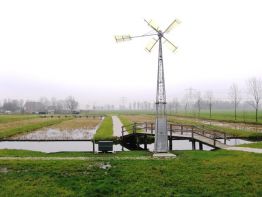Project Aim
The main aim of the UWC project was to show in practice how to optimise the overall performance of the urban water cycle with respect to the built environment in which it is embedded in. Specific attention was paid to organisational, legal and financial aspects of urban water cycle management in the North Sea Region.
Project implementation and results
The UWC project has resulted in new insights and strategies to optimise the urban water cycle by the exchange of local knowledge and experiences. Increasing the efficiency of water cycles will improve water quality, leading to greater bio-diversity and a healthier environment. Thus they will be more cost-effective whereby financial waste can be reduced.
The project has shown that there is a strong relationship between the urban water cycle, the urban water system and spatial planning. Optimising the urban waste cycle also included minimizing negative effects of the urban water cycle on the water system. Therefore measures were taken to on the one hand improve the purification of waste water and storm water and on the other hand separate water flows that should not be mixed in the first place. These measures have considerable effect on the built environment as urban water becomes more of an ordering principle in renewal projects as well as that in new housing development projects.
Innovative solutions
The project has had innovative and unique elements in keeping these effects in mind. The regional results proved the unique character of the project. One such example was pilot project in the municipality of Ootmarsum (NL) where the Waste Water Treatment Plant (WWTP) discharges effluent into a stream with high ecological potential. In order to resuscitate the ecological potential, the water board together with the municipality has developed a reconstruction plan. The hybrid configuration, combined with the innovative buffer tank draws a fair bit of attention. The typical kind of sand filtration used in Ootmarsum aided with the further development of sand filtration techniques. This project received a wide amount interest which formed a key part in the UWC project.
Leverage of extra investment
In Fryslân (NL) a small project change led to additional funding of € 600.000 for the water-art connection. Additionally this research was going on to copy the Aqualan project in another WWTP in Bergum.
Joint transnational strategy
The implementation of transnational exchange projects progressed during the project period and resulted in the sharing of experience, knowledge and information gained through the implementation of the activities. Overall there has been a close relation between local pilot projects and transnational cooperation.
Impact of the project
Long-term achievement
The partners expect that the contacts and networks gained during the project period will remain in place after finishing the project in 2008, ensuring that the sustainable management of water cycles remains at the forefront of urban development.
Policy shaping
Some of the results of the projects will be used for changing and/or influencing policy and planning. In Enschede (NL) the reintroduction of open water (pilot Roombeek) will be used in planning of existing areas in the near future. The conclusions of the STOWA exploration study for water treatment techniques together with the EU Water Framework Directive is used by water authorities as a handbook and guideline for new developments on water treatment. The findings will possibly change or influence the legislation and could also shape future policies for water boards and relevant authorities.
In terms of political agreements, the local project in Hamburg was agreed upon by the political leader for the environment in Hamburg where the results were presented under attendance of the Hamburg’s Secretary for Environmental Affairs. The Water Board Fryslân is enthusiastic about the Aqualan project and is looking for a follow up. In Bradford, the politicians are also enthusiastic about the results of the project and are supporting further projects linking water management, regeneration and spatial planning together. There is in place in Bradford an agreement to make water part of urban development and spatial planning. |

Ecological filter in Fryslân (NL)
Partners Municipality of Karlebo, DK
Umweltbehörde Hamburg, BUG, DE
Province of Fryslân, NL
City of Bradford, UK
LP:
Water Board Regge en Dinkel
Project Manager
Ted de Jong
Water Board Regge en Dinkel Kooikersweg 1
P.O.Box 5006 NL-7600 GA Almelo
The Netherlands
t.j.dejong@wrd.nl
www.urbanwatercycle.org
Tel: +31 546 83 25 72
Measure: 4.2
Start Date: 25 February 2004
End Date: 30 June 2007
ERDF Grant:
 3.854.586,00 3.854.586,00
Total Eligible Sum:
 7.709.172,00 7.709.172,00
|